Iran and Qatar consider establishing joint currency exchange entity
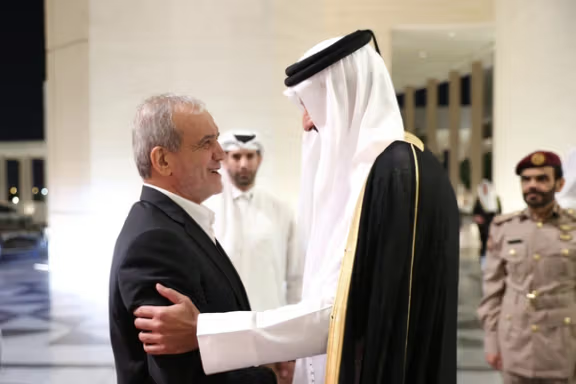
The head of Iran-Qatar Joint Chamber of Commerce has proposed the establishment of a financial institution aimed at facilitating transfer of funds to and from Qatar.

The head of Iran-Qatar Joint Chamber of Commerce has proposed the establishment of a financial institution aimed at facilitating transfer of funds to and from Qatar.
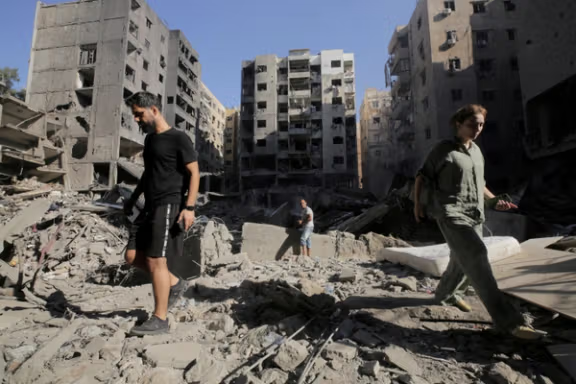
A former top commander of Iran’s Revolutionary Guard says that Hezbollah leader Hassan Nasrallah’s body was not injured by large bunker-buster bombs that Israel dropped on an underground hideout.
Media in Tehran quote General Abdolfateh Ahvazian as saying that “What we are certain of at the moment is that Martyr Nasrallah’s body was not hit by shrapnel, but his ring shattered due to the intensity of the explosion's shockwave.”
However, he expressed suspicion that Israel might have also used cyanide gas in the bombs poisoning those hiding as deep as 90 feet under a six-story building in Beirut’s southern suburbs on September 28. Ahvazian added that autopsies on others who died in the bunker can shed light on whether a poisonous gas was used. The reason many have not buried yet could be a delay for such examinations, he said.
The IRGC general admitted that the sheer shockwave from the explosions would have been enough to kill people in the bunker by bursting their arteries and veins, without any shrapnel injuries.
According to Israeli media, the Hezbollah leader died a slow and painful death from toxic gas inhalation in an unventilated bunker. Lebanese authorities said Nasrallah’s body was removed intact from the blast scene on Saturday, adding that his death was caused by blunt trauma.
Source close to the Lebanese group have said that his remains are being kept at a secret site. “Hassan Nasrallah has been temporarily buried until the circumstances allow for a public funeral,” AFP quoted the unnamed source as saying.
Ahvazian also made comments about the killing of Hamas leader Ismail Haniyeh in Tehran in late July. He argued that Israel could have killed Haniyeh in many other Sunni countries he often visited, but they decided to assassinate him in Iran, a Shia country, to sow discord among Muslims.
The double-killing of the two militant leaders considered Tehran’s allies and proxies, put political pressure on Iran to respond and avoid being seen as weak and ineffectual in the face of Israeli attacks. Tehran finally launched a large missile attack on Israel on October 1, which was in fact largely ineffective with no Israeli casualties.
Ahvazian, while condemning the “cowardly manner” in which Hassan Nasrallah was killed by Israel, stated: "Never before in history has there been an instance where nearly 85 tons of bunker-buster and anti-fortification bombs were dropped in one location, leveling six six-story buildings and sending the shockwave dozens of meters underground."
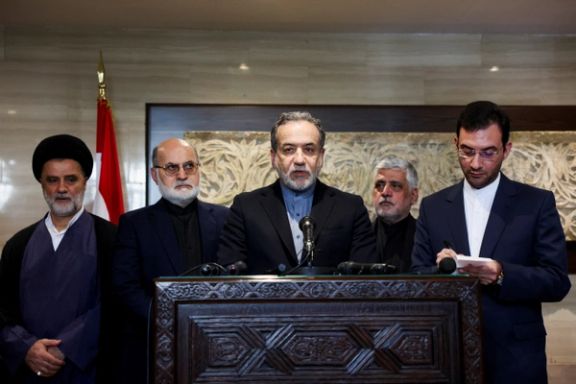
Iran backs a ceasefire in Lebanon, but only if it has Hezbollah's support and occurs simultaneously with a ceasefire in Gaza, Iranian Foreign Minister Abbas Araghchi said on Friday during a press conference in Beirut.
"We support efforts for a ceasefire on the condition that it would be acceptable to the Lebanese people, acceptable to the resistance, and thirdly, it would be synchronized with a ceasefire in Gaza," he said.
Araghchi's Friday visit to Lebanon comes amid heightened tensions in the region, with airstrikes hitting near Beirut's airport overnight and ongoing Israeli ground operations in southern Lebanon.
Marking his first official visit to Lebanon since assuming office, Araghchi stressed Iran's unwavering support for Hezbollah, stating that his presence in Beirut, despite the bombings, reflects this commitment. "Iran will always stand with the people of Lebanon," he tweeted.
Esmaeil Baghaei, Iran’s Foreign Ministry spokesperson, also announced via Twitter that the delegation would deliver 10 tons of food and medicine as humanitarian assistance to Lebanon.
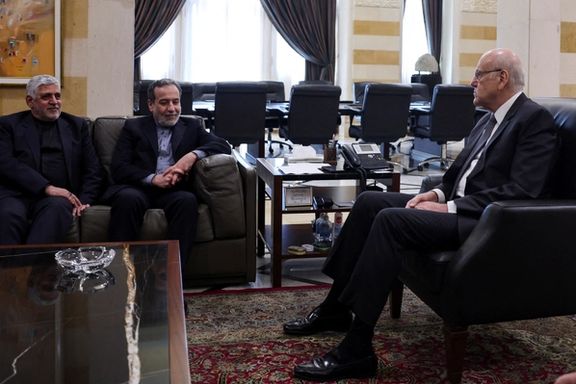
Iranian state media reported that the visit has a dual purpose: to support the Resistance—Tehran’s term for militias it backs in the region—and to preserve political and diplomatic processes. "Araghchi's visit to Beirut, following the change in government and his participation in the UN General Assembly with a firm anti-Israel stance, signals that the Islamic Republic of Iran's policy will remain steadfast, even in the face of new circumstances," Fararu wrote.
During his trip, Araghchi met with Lebanon's caretaker Prime Minister Najib Mikati and Parliament Speaker Nabih Berri, a close ally of Hezbollah. In meetings with Lebanese officials, Araghchi emphasized the need for global unity to prevent the region from falling into an "imposed and unwanted war," warning against the repetition of "Israel’s heinous crimes in Gaza" in Lebanon, according to Iran's Foreign Ministry Spokesperson.
Tensions in the region have sharply escalated since September when Israeli Defense Minister Yoav Gallant announced an expansion of military operations targeting Hezbollah in northern Israel and Lebanon. Gallant said the action was necessary for the safe return of civilians displaced by Hezbollah attacks since October 8.
On September 17 and 18, around 1,500 Hezbollah fighters were severely injured by explosions caused by tampered pagers and walkie-talkies. This added to the growing conflict.
The situation worsened earlier this week when Iran entered the arena again to launch missile strikes on Israel in retaliation for the deaths of Hezbollah leader Hassan Nasrallah and Iranian commander Abbas Nilforoushan, both killed in an Israeli airstrike in Lebanon. As tensions continue to rise, Israel has promised further retaliation, sparking fears of potential strikes on Iran’s oil or nuclear facilities.
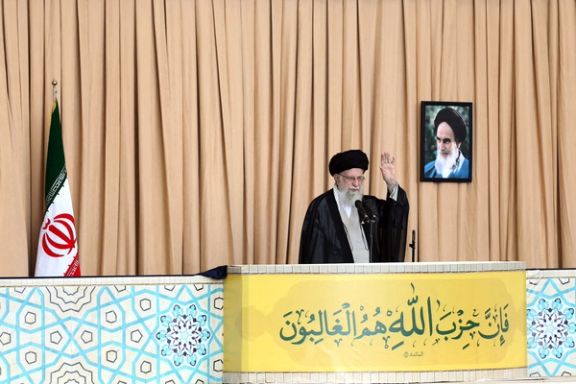
Iran’s Supreme Leader Ali Khamenei led Tehran’s Friday prayers for the first time in five years, delivering a sermon in Persian and Arabic where he reiterated his support for Arab groups fighting Israel.
Khamenei's speech came amid expectations of an imminent Israeli retaliation following Iran's large missile strike on Israel on Tuesday. While many anticipated that he would address either Israel’s expected response or Tehran’s nuclear program, Khamenei avoided both topics during his sermon.
The cleric instead praised his state’s missile attack, calling Israel the "rabid dog" of America with the character of a wolf, saying, "the brilliant work of our forces just a few nights ago was also completely within their rights”.
Khamenei called for unity among Muslim nations, stating “We have to tighten the belt of defense, ... from Afghanistan to Yemen, Iran to Gaza and Lebanon, in all Islamic countries. That’s the first issue I wanted to discuss.”
The 85-year-old leader’s rare appearance at the Friday Prayers came amid a recent wave of assassinations targeting his key allies, including Hezbollah leader Hassan Nasrallah, who was killed in an Israeli strike. Seated in one of the prominent seats next to Khamenei, was Abdullah Safieddine, Hezbollah's representative in Iran and brother of Hashem Safieddine, who was targeted by Israel the previous night.
The second part of Khamenei's sermon, delivered in Arabic, solicited mockery from Iranian social media users, who noted that the cleric read from a script, made several errors, and spoke with an accent that many Arabic speakers found difficult to understand.
The lengthy message in Arabic largely criticized the involvement of the US and its allies in the Middle East, regarding their support for what he referred to as the "occupying regime" (a term typically used by Iranian state leadership to refer to Israel).
Repeating his assertion that US and Western support for Israel is aimed at "seizing all the resources of this region," particularly its oil wealth, the Supreme Leader stated, "In this scenario, any blow, by any individual or group, against this regime [Israel] is a service not only to the region but to all of humanity."
These strikes followed the high-profile Israeli assassinations of Hezbollah's Nasrallah and a senior IRGC commander in Lebanon. Additionally, a purported Israeli strike in July killed Hamas political leader Ismail Haniyeh in Tehran.
While Khamenei and other Iranian officials have maintained that their missile retaliation against Israel was within their legal rights, experts told Iran International that this justification is questionable. Haniyeh was not Iranian official, and the Iranian figures who were assassinated were not killed on Iranian territory. Therefore, some experts have argued, Iran lacks a valid legal basis for its retaliatory attack on Israel under international law.
Throughout his speech, Khamenei spoke about the rights of the Palestinian people and defended Hezbollah, asserting that no one should criticize the militant group for supporting and defending the Palestinian cause.
Addressing the people of Lebanon, Khamenei said they should not lose hope or purpose in the face of the loss of key figures, alluding to Nasrallah and other prominent Hezbollah leaders.
Earlier this week, Iranian President Masoud Pezeshkian warned that Tehran would deliver a strong response to any further Israeli actions, reiterating Iran’s capability to defend itself.
Pezeshkian also emphasized that Tehran is not seeking an all-out war with Israel, stressing the importance of regional stability and cautioning against further provocations. The diplomatic balance remains precarious, with Iran signaling both readiness for defense and restraint in avoiding a broader regional conflict.
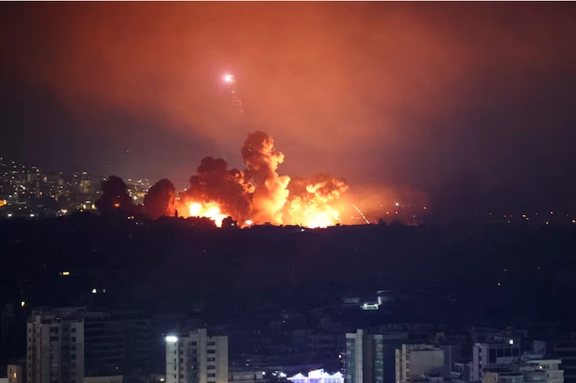
High-ranking IRGC officers and hardliner loyalists have been suggesting that the Islamic Republic should deploy volunteers and military forces to Lebanon to assist Hezbollah in the wake of devastating Israeli strikes.
IRGC General Esmail Kowsari, who is currently a member of the Iranian parliament's national security committee, told Didban Iran website in Tehran: "Although the Lebanese Hezbollah is capable of confronting the IDF, we welcome the deployment of volunteer forces to Lebanon from Iran."
Kowsari also promised that Israel's spies and infiltrators in Lebanon will be identified and punished. Following the death of Hezbollah leader Hasan Nasrallah in Beirut in an Israeli strike last week, some hardliners in Iran, including the former head of the international affairs department of Khamenei's office and former lawmaker and intelligence officer Mohammad Hassan Asafari insisted that volunteers from Iran should be deployed to Lebanon.
Hardliners in Iran made similar claims last year, vowing to send millions of volunteers to Gaza following the October 7 attack on Israel and the outbreak of war. However, reaching Gaza was physically impossible at the time. Now, in response to these renewed statements, Iranians opposed to the Islamic Republic are pointing out that the road to Lebanon is open, and those who truly “volunteer” should have no hesitation in going.
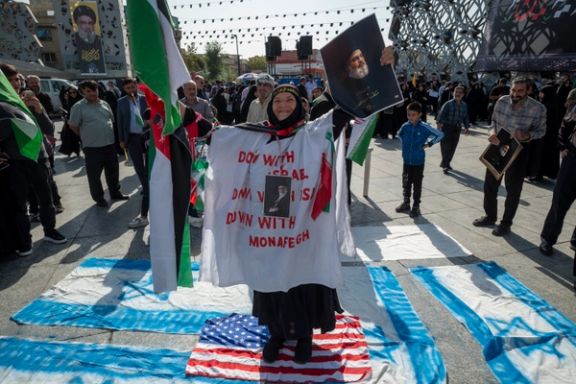
Meanwhile, videos circulating on social media showed banners calling for the deployment of Iranian combatants through Tehran airport. A viewer who shared one of these videos with Iran International TV mentioned that buses were on-site to transport volunteers to the airport, but no actual deployment plan seemed to be in place upon arrival.
Kowsari further opined that Israeli forces are not capable of being involved in military actions in two fronts in Gaza and Lebanon, despite clear evidence to the contrary.
Another IRGC General Morteza Rafighdoost, who was the Islamic Republic's IRGC Minister from 1982 to 1988, said in an interview that "All options including deploying military forces from Iran to Lebanon and the Golan Heights in Syria is on Iran's agenda."
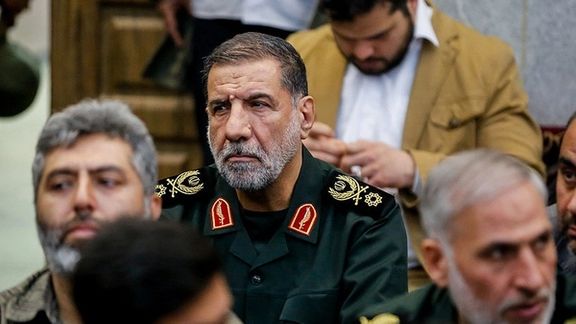
Rafighdoost claimed that "Iran has the manpower for decades of war against all the world powers." He also stated that Iran does not need the support of Russia or China in its confrontation with Israel. Furthermore, he boasted that Iran’s massive ballistic missile attack on Israel had brought joy to "hundreds of millions of people" worldwide, despite widespread condemnation of the attack and evidence showing that many missiles failed to hit their targets.
Meanwhile, aviation experts on social media criticized Iranian officials for not clearing the country's airspace before launching the October 1 attack. Videos on social media show passenger aircraft changing route over Urmia and landing in Shiraz against a backdrop of missiles flying in the sky despite the obvious danger for civilians. In the meantime, some failing missiles dropped in areas including Zanjan near Tehran.
In another interview, IRGC General Nosrat Ahvazian claimed that at least two million Iranians were ready to be deployed to Lebanon to fight Israel. However, in the same interview, he dismissed Israeli officials’ promises of a major retaliatory attack on Iran following Tehran's ballistic missile strike on Tuesday night. Interestingly, despite initially citing the two million figure, Ahvazian later stated that 400,000 Iranian "resistance fighters" were prepared for deployment to Lebanon, contradicting his earlier claim.
Ahvazian who led a secret IRGC headquarters during the Iran-Iraq war in the 1980s, further claimed that tens of Iranian youths call him over the phone every day and beg to be deployed to Lebanon.
In a more strange comment, Ahvazian said that the reason why Israeli forces have attacked Lebanon is that they want to flee Gaza where they have a hard time fighting Hamas.
These and similar remarks about Iranians' willingness to fight in Lebanon seem to be part of the IRGC's psychological operations aimed at masking their own and the public’s fear of an impending major strike on Iran’s infrastructure, as promised by Israeli officials.
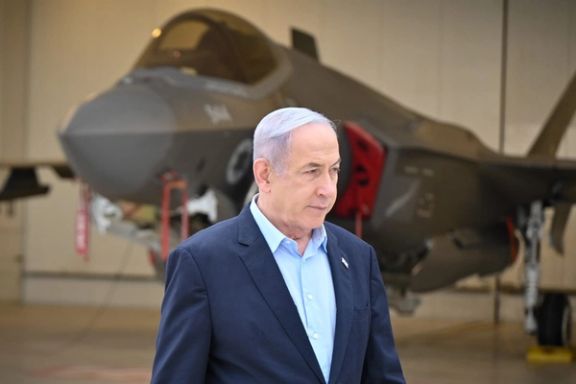
After two months of warnings, Iran’s Islamist government attacked Israel on October 1, 2024, with 200 ballistic missiles. Iranians and Israelis watched as missiles flew over cities, debris falling from the sky after being intercepted.
Three key questions arise about the "True Promise II" operation: Why did the Islamic Republic take this action despite concerns over "Netanyahu's trap," especially after the failure of "True Promise I" in April? Has the government provided a verifiable, fact-based report on the operation? And finally, what will the consequences be?
Two months of hesitation
In response to Ismail Haniyeh’s elimination, the Iranian government hesitated for two months, grappling with doubts. However, after Nasrallah’s removal, they decided to act more swiftly. The dilemma following Haniyeh’s death was the risk of sparking a large-scale war with Israel versus losing credibility among the regime’s loyalists and regional allies.
After Nasrallah's death, hardliners inside Iran demanded "severe revenge." Hamas and Hezbollah awaited Iran’s support amidst Israel’s devastating attacks, creating pressure on the government. These expectations had to be balanced against the serious risks of a direct confrontation with Israel.
In the end, the government chose to reassure Hamas and Hezbollah of its commitment to their cause and risk more conflict. Now, the ball is in Israel's court, and Israeli officials have indicated that the response would be "painful".
Reports suggest that targets could include key oil export terminals like Khark or vital oil and gas pipelines, impacting the government’s revenue streams without damaging infrastructure essential to the public, such as power plants. Netanyahu aims to avoid rallying the Iranian people to the regime’s side in this conflict.
Propaganda
Within 24 hours of the attack, the IRGC and the Islamist government’s propaganda apparatus released two sets of false or unverifiable claims. The first was the missile count. Most international and Israeli sources reported around 180-200 missiles. But Iranian state-controlled media said 400—higher than the 300 projectiles used in the "True Promise I" operation, likely to emphasize the second attack's increased power.
Additionally, the IRGC claimed that 90% of the missiles hit Israel, a figure that cannot be verified by ground observations or reports from numerous news agencies.
Consequences
The IRGC said the operation was in retaliation for the deaths of Hassan Nasrallah, Ismail Haniyeh, and Abbas Nilfroushan. This would be a much weaker grounds to justify a missile attack compared to the one in April, which was a response to Israel's attack on its consulate building in Damascus.
So the situation now is materially different.
True Promise II has potentially exposed the Islamic Republic to significant consequences. Following the events of October 1, Netanyahu could now justify targeting any location in Iran without facing significant legal obstacles, defending such actions in international forums.
Whether or not the Islamic Republic's missiles successfully hit their intended targets is secondary; the primary issue is that Israel's national sovereignty has been violated, giving it grounds for retaliation under international law.
With this attack, the Islamic Republic not only made itself and its public infrastructure legitimate targets for Israel but may have conveyed the limits of offensive military options. The country lacks a modern, powerful air force and defense system. Since the Iran-Iraq war, not a single civilian shelter has been built to protect against large-scale air strikes.
These shortcomings have led regime security experts to call for testing a nuclear bomb, while Ahmad Naderi, a senior member of the parliament, and other hardliners have stated that "the time has come to revise the nuclear doctrine."
Mostafa Salehinejad discussed the plan a day after President Masoud Pezeshkian returned from Qatar. Upon his arrival, the President announced that Tehran had reached an "understanding" with Doha regarding the $6 billion Iranian fund, which had been released last year from South Korean banks and is currently held in Qatar.
In August 2023, the US and Iran reached an agreement that led to the exchange of five detained Americans in Tehran for five Iranians imprisoned in the US. A crucial part of the deal was the transfer of $6 billion in frozen Iranian assets from South Korean banks to Qatar, allowing Iran conditional access to the funds for the purchase of non-sanctioned goods.
However, following the Hamas attack in October, the US and Qatar agreed to impose restrictions on Iran's access to these funds, halting the full disbursement but not completely freezing the assets.
Iran's Ministry of Foreign Affairs said in December that the money is accessible to Iran despite calls from Washington to withhold it. The Central Bank of Iran said earlier this year that the fund is deposited in Iran’s accounts in two Qatari banks. Pezeshkian’s remarks in Doha hinted that restrictions continue to prevent Tehran from accessing the funds.
Iran's international banking transactions are also under US sanctions, which hampers fund transfers to and from the country.
Salehinejad expressed hope that the president's visit would result in the establishment of an exchange bureau, which would significantly streamline financial transactions.
A joint exchange house could potentially help in bypassing international sanctions, allowing Iran greater access to foreign currency and enabling smoother trade operations.
“Iranian traders currently have to transfer their foreign earnings to the UAE first and then to Iran, which reduces their profits by 20%,” he said.“The main solution is the establishment of a joint bank, which does not seem feasible due to sanctions" imposed on Iran’s banking sector.
Underlining that Qatar is committed to international laws that focus on sanctions against Iran, Salehinejad said that “under these circumstances, if the outcome of the Iranian President's visit to Qatar is the establishment of this very currency exchange entity, it will be a significant achievement.”
He noted that the plan was under study during the previous Iranian administration and voiced optimism that it will be implemented under the current one.